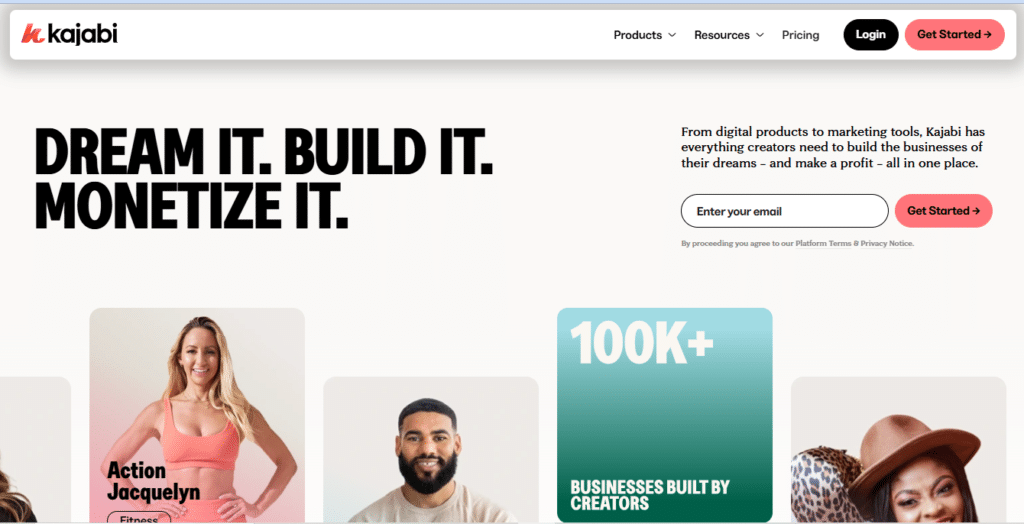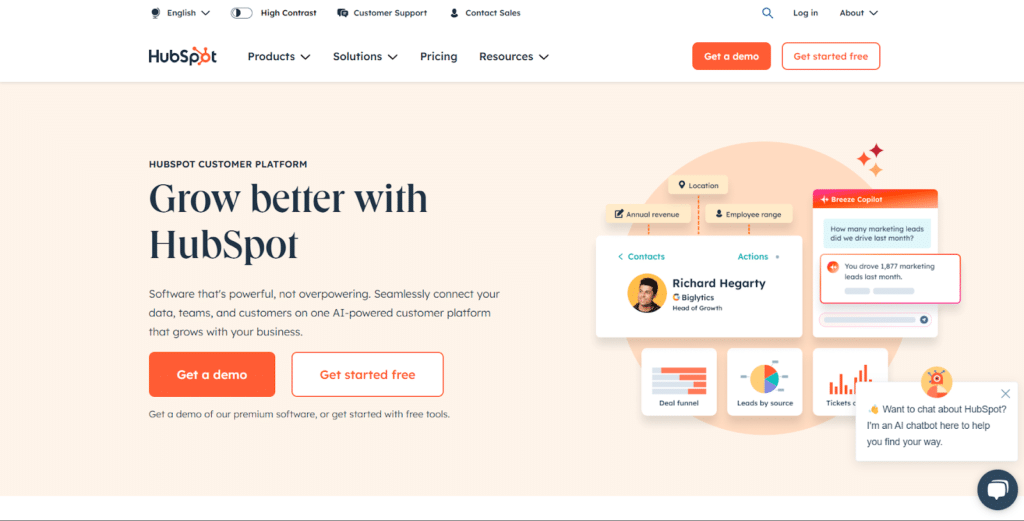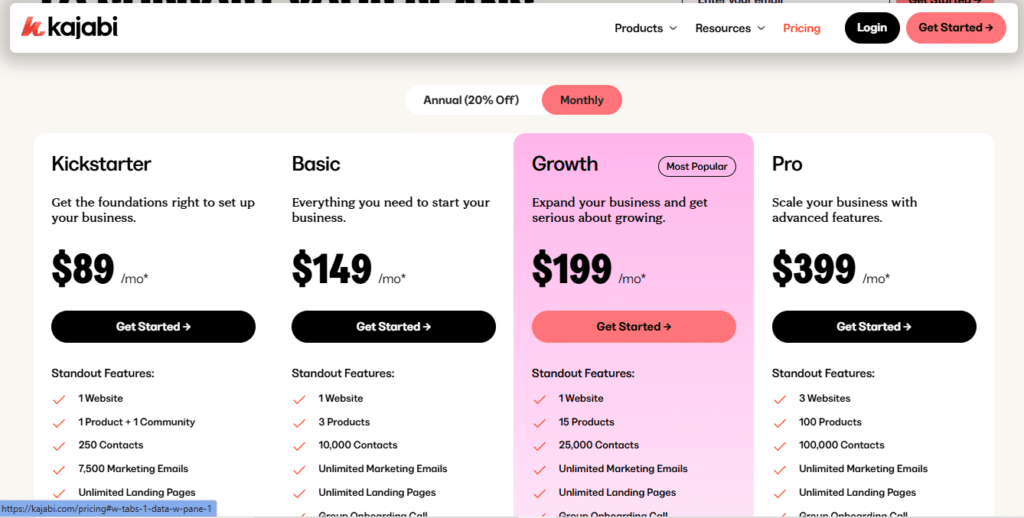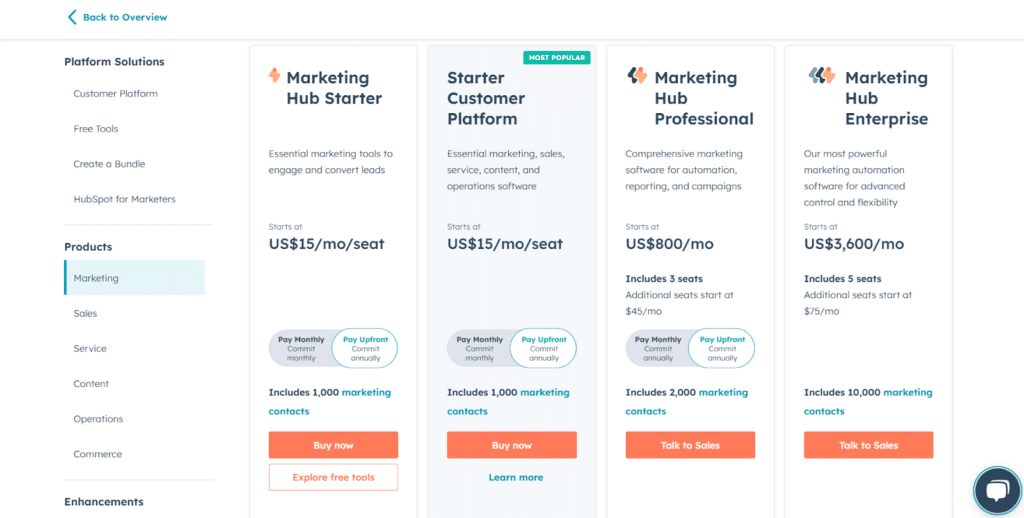Kajabi vs HubSpot: A Comprehensive Platform Comparison
When building and scaling an online business, choosing the right platform can significantly impact your growth trajectory and operational efficiency. Kajabi and HubSpot represent two powerful but fundamentally different approaches to digital business management. While Kajabi focuses on course creation and knowledge commerce, HubSpot specializes in comprehensive customer relationship management and marketing automation. This detailed comparison will help you determine which platform better aligns with your specific business needs, whether you're primarily focused on selling knowledge products or building sophisticated marketing and sales operations.
Overview of Kajabi

Kajabi is an all-in-one platform designed for entrepreneurs, creators, and educators looking to build and scale their online businesses. It provides a comprehensive ecosystem for creating, marketing, and selling digital products such as online courses, memberships, and coaching programs—all without relying on multiple third-party tools.
With its integrated website builder, email marketing automation, and sales pipeline creation, Kajabi simplifies the process of running a digital business. Even users with minimal technical knowledge can easily create high-quality content using pre-built templates and intuitive drag-and-drop functionality. By integrating powerful marketing tools with a robust learning management system (LMS), Kajabi enables businesses to efficiently attract, engage, and convert their audience while maximizing revenue—all from a single, user-friendly dashboard.
Key Features of Kajabi
- Course Creation Tools: Develop and deliver engaging online courses with video content, assessments, and drip-fed lessons.
- Website Builder: Design fully responsive, professional websites with built-in blogging capabilities and customizable templates.
- Sales Pipelines: Create automated funnels for lead generation, product launches, and webinars.
- Email Marketing Automation: Send personalized email campaigns, track engagement, and automate follow-ups.
- Membership Capabilities: Set up subscription-based memberships to generate recurring revenue.
- Payment Integration: Securely accept payments via Stripe and PayPal with zero additional transaction fees.
- Analytics Dashboard: Monitor revenue, track customer behavior, and measure marketing performance with in-depth insights.
- Community Features: Build an interactive member space for discussions, engagement, and networking.
Ideal User Base for Kajabi
- Course Creators: Educators and professionals looking to monetize their knowledge through online courses.
- Coaches & Consultants: Those offering coaching services, webinars, and one-on-one mentorship programs.
- Membership Site Owners: Entrepreneurs looking to create thriving subscription-based communities.
- Digital Entrepreneurs: Individuals managing multiple digital products and looking for a streamlined business solution.
Overview of HubSpot

HubSpot is a comprehensive customer relationship management (CRM) platform that unifies marketing, sales, content management, and customer service into a centralized ecosystem. Founded in 2006 by Brian Halligan and Dharmesh Shah, HubSpot pioneered the concept of inbound marketing and has evolved into a powerful suite of tools designed to attract, engage, and delight customers throughout their journey.
Unlike platforms focused primarily on specific business functions like course creation, HubSpot provides a broader infrastructure for managing customer relationships across multiple touchpoints. The platform's strength lies in its ability to create seamless experiences from initial contact through the sales process and ongoing customer success, with robust data integration and reporting across all business operations.
HubSpot's modular approach allows businesses to start with free tools and gradually add more sophisticated capabilities as they grow, making it suitable for organizations ranging from startups to enterprise-level companies. While it doesn't specialize in course delivery or membership management, HubSpot excels in creating sophisticated marketing and sales operations that can support virtually any business model, including knowledge commerce when integrated with specialized tools.
Key Features of HubSpot
- CRM Platform: Centralized customer database with complete interaction history and relationship management.
- Marketing Hub: Tools for email marketing, automation, social media, SEO, and campaign management.
- Sales Hub: Features for pipeline management, meeting scheduling, email tracking, and sales automation.
- Service Hub: Customer service tools including ticketing, knowledge base, feedback surveys, and automation.
- CMS Hub: Website building capabilities with personalization, SEO optimization, and CRM integration.
- Operations Hub: Data synchronization, custom automation, and data quality management across the platform.
- Analytics & Reporting: Comprehensive dashboards and reports covering marketing, sales, and service performance.
- Integration Ecosystem: Extensive connections with third-party applications and services.
Ideal User Base for HubSpot
- Growth-Focused Companies: Businesses seeking scalable systems for marketing, sales, and customer management.
- B2B Organizations: Companies with complex sales cycles requiring sophisticated lead nurturing and tracking.
- Marketing Teams: Professionals needing comprehensive tools for inbound and outbound marketing campaigns.
- Sales Operations: Teams looking to optimize sales processes and improve conversion rates.
- Customer-Centric Businesses: Organizations prioritizing relationship management across the entire customer lifecycle.
Core Functionalities Comparison
When evaluating Kajabi and HubSpot, it's important to understand how they compare across key functional areas that impact your business operations and growth potential. Let's explore their capabilities in several critical domains:
1. Primary Platform Focus and Philosophy
Kajabi is designed specifically for knowledge commerce, focusing on helping entrepreneurs create, market, and sell digital products like courses and memberships. Its philosophy centers on providing an all-in-one solution for knowledge entrepreneurs who want to minimize technical complexity while maximizing their ability to package and sell expertise. Kajabi prioritizes simplicity and integration, bringing together essential tools for course creators in a cohesive environment without requiring multiple platforms or complex integrations.
HubSpot focuses on customer relationship management across the entire business ecosystem. Its philosophy is built around the inbound methodology—attracting prospects with valuable content, converting them through personalized experiences, and nurturing long-term relationships. Rather than specializing in one business model like knowledge commerce, HubSpot provides a flexible infrastructure that can support virtually any business type with sophisticated marketing, sales, and service operations. The platform emphasizes data continuity across customer touchpoints to create seamless experiences and informed business decisions.
2. Content Creation and Management
Kajabi excels in structured content creation for educational purposes. The platform offers intuitive tools for organizing courses into categories, modules, and lessons with support for various media types including video, audio, text, quizzes, and downloads. Kajabi's strength lies in creating engaging learning experiences with features like drip content, assessments, and progress tracking. The platform also includes a basic blog and page builder for marketing content, though these are less sophisticated than its course-building capabilities. For knowledge entrepreneurs, Kajabi's content tools are specifically optimized for educational delivery rather than general content marketing.
HubSpot provides comprehensive content management through its CMS Hub, focusing on marketing-oriented content rather than structured courses. The platform excels in creating personalized website experiences, blogs, landing pages, and email content with sophisticated tools for SEO optimization, A/B testing, and audience targeting. HubSpot's content capabilities emphasize conversion optimization, personalization based on contact properties, and detailed performance analytics. While powerful for marketing content, HubSpot lacks dedicated tools for structured course creation or membership content, requiring integration with specialized platforms for these functions.
3. Marketing Capabilities
Kajabi includes marketing tools designed specifically for selling knowledge products. The platform's “Pipelines” feature offers pre-built marketing funnels for scenarios like lead magnets, webinars, and product launches with customizable emails and pages. Kajabi's email marketing supports broadcasts, sequences, and basic automations triggered by user behavior. The platform provides decent segmentation based on tags, product purchases, and form submissions. While effective for course marketing, Kajabi's marketing capabilities are somewhat specialized compared to dedicated marketing platforms, focusing primarily on direct response and conversion rather than comprehensive inbound marketing.
HubSpot's Marketing Hub offers enterprise-grade marketing capabilities suitable for virtually any business model. The platform provides sophisticated tools for email marketing, social media management, SEO, paid advertising, landing pages, and marketing automation. HubSpot excels in creating personalized marketing experiences based on detailed contact properties and behaviors tracked across channels. The platform's strengths include multi-touch attribution, advanced segmentation, A/B testing, and predictive lead scoring. For businesses requiring sophisticated marketing operations beyond just selling courses, HubSpot offers significantly more depth and flexibility than Kajabi's focused marketing tools.
4. Sales and CRM Functionality
Kajabi includes basic contact management rather than a full CRM. The platform allows tracking student information, purchase history, and course engagement, with tagging capabilities for basic segmentation. Kajabi's sales tools focus specifically on digital product transactions, with features for checkout optimization, upsells, and payment plans. While adequate for straightforward course sales, Kajabi lacks comprehensive sales pipeline management, opportunity tracking, or sophisticated lead nurturing found in dedicated CRM systems.
HubSpot's Sales Hub provides extensive CRM capabilities designed for managing complex sales processes. The platform offers visual pipeline management, detailed contact and company records, opportunity tracking, email integration, meeting scheduling, and sales automation. HubSpot excels in providing visibility into the entire sales process with features like email tracking, call recording, conversation intelligence, and sales analytics. For businesses with dedicated sales teams or complex B2B sales cycles, HubSpot delivers significantly more robust sales management than Kajabi's transaction-focused approach.
5. Course Creation and Learning Management
Kajabi shines in course creation and learning management as a core function. The platform provides specialized tools for building structured educational experiences with features like progress tracking, assessments, certificates, and student engagement metrics. Kajabi supports various learning formats including video-based courses, text content, downloads, and quizzes, with options for drip scheduling and prerequisite lessons. For businesses centered on educational content, Kajabi offers a purpose-built learning environment designed to optimize student experience and completion rates.
HubSpot does not include native course creation or learning management capabilities, as these functions fall outside its core focus on CRM and marketing. Businesses using HubSpot for these purposes would need to integrate with dedicated learning management systems (LMS) or course platforms. However, HubSpot's Academy—its own educational resource—demonstrates the platform's capabilities when combined with custom development, offering structured courses, certifications, and learning paths. For most users, implementing course functionality with HubSpot would require significant custom development or integration with specialized platforms.
6. Website Building and Content Management
Kajabi provides a solid website builder focused on creating sites for knowledge businesses. The platform offers customizable themes, a block-based editor, and templates specific to course creators and coaches. Kajabi websites include standard features like custom domains, responsive design, blogging capabilities, and basic SEO tools. While functional for many knowledge entrepreneurs, Kajabi's website capabilities are somewhat limited compared to dedicated website platforms, particularly for complex content management needs or highly customized designs.
HubSpot's CMS Hub offers sophisticated website and content management capabilities suitable for growing businesses. The platform includes a drag-and-drop page editor, themes, and templates with more extensive customization options than Kajabi. HubSpot distinguishes itself with features like personalized content based on visitor attributes, adaptive testing for optimization, content scheduling, and multilingual support. The CMS integrates deeply with HubSpot's marketing and sales tools, enabling dynamic content based on contact properties and behaviors. For businesses requiring more advanced website capabilities, particularly for personalization and growth-driven design, HubSpot offers greater depth and flexibility.
7. Analytics and Reporting
Kajabi provides business-focused analytics centered on revenue, product performance, and student engagement. The platform offers dashboards for tracking sales, conversion rates, student progress, and email metrics, giving course creators essential visibility into their business performance. While comprehensive for knowledge business needs, Kajabi's analytics are somewhat limited in scope and customization compared to enterprise analytics solutions.
HubSpot delivers extensive analytics capabilities spanning marketing, sales, and service performance. The platform includes customizable dashboards, conversion attribution, revenue analytics, and detailed reporting across all customer touchpoints. HubSpot excels in connecting marketing activities to sales outcomes with multi-touch attribution models and revenue reporting. The platform also offers advanced analytics features like predictive lead scoring, custom report builders, and goals tracking. For data-driven organizations requiring sophisticated insights across business functions, HubSpot provides significantly more powerful analytics than Kajabi's focused reporting.
Pricing Comparison: Kajabi vs HubSpot
Understanding the pricing structures of both platforms is essential for making an informed decision based on your budget and business requirements.
Kajabi Pricing Plans

Kajabi offers several tiered pricing options designed to accommodate businesses at different growth stages:
1. Basic Plan ($149/month)
The Basic Plan is ideal for newcomers to online business. It includes essential tools to get started, such as:
- Support for 3 products and 3 pipelines.
- 10,000 contacts and 1,000 active members.
- Basic marketing automation.
- Unlimited landing pages and emails.
2. Growth Plan ($199/month)
The Growth Plan is perfect for scaling businesses that require advanced marketing features and greater resource limits:
- Support for 15 products and 15 pipelines.
- 25,000 contacts and 10,000 active members.
- Advanced automation and affiliate program management.
- Removal of Kajabi branding for a more customized experience.
3. Pro Plan ($399/month)
The Pro Plan is designed for established businesses with high-volume requirements:
- Support for 100 products and 100 pipelines.
- 100,000 contacts and 20,000 active members.
- Priority support and custom branding capabilities.
- Advanced features such as code editor access for deeper customization.
4. Kickstarter Plan ($89/month)
This budget-friendly option is ideal for beginners who want to test Kajabi's core functionalities before committing to higher-tier plans:
- Limited products and pipelines.
- Basic features for course creation and email marketing.
All Kajabi plans include a 14-day free trial, and users can save approximately 20% by opting for annual billing.
HubSpot Pricing Structure

HubSpot offers a tiered pricing structure for its Marketing Hub, designed to cater to businesses of varying sizes and needs. The plans are divided into three primary categories: Starter, Professional, and Enterprise, each offering unique features and capabilities.
The Marketing Hub Starter plan starts at $15 per month per seat. This plan includes essential tools for engaging and converting leads, such as email marketing, live chat, forms with increased limits, and the ability to remove HubSpot branding. Additional features include simple marketing automation, email and in-app chat support, and Messaging Insights (Beta). It comes with 1,000 marketing contacts and is suitable for small businesses looking for affordable marketing solutions.
The Marketing Hub Professional plan is priced at $800 per month and includes three seats, with additional seats available for $45 per month. This plan supports 2,000 marketing contacts and provides advanced features such as dynamic personalization, omni-channel marketing automation, custom reporting, lead scoring, and the Lead Scoring App. Other highlights include Teams, Social Media tools, and Marketing SMS (as an add-on). However, this plan requires a one-time Professional Onboarding fee of $3,000.
The Marketing Hub Enterprise plan starts at $3,600 per month and includes five seats, with additional seats priced at $75 per month. Supporting 10,000 marketing contacts, it offers all the features of the Professional plan, plus advanced tools like custom events, custom objects, multi-touch revenue attribution, and customer journey analytics. Other enterprise-grade functionalities include content and data access restrictions, AI social inbox insights (Beta), and enhanced team organization. This plan also requires a one-time Enterprise Onboarding fee of $7,000.
Additionally, HubSpot offers a Starter Customer Platform bundle starting at $15 per month per seat. It combines Marketing Hub Starter with Sales Hub Starter, Service Hub Starter, Content Hub Starter, and Operations Hub Starter, making it a cost-effective solution for businesses seeking an integrated approach to marketing, sales, service, and content management.
HubSpot’s pricing structure ensures flexibility and scalability, making it a versatile choice for businesses of all sizes.
Making the Right Choice for Your Business
Choosing between Kajabi and HubSpot ultimately depends on your specific business focus, growth stage, and operational requirements. Here's guidance to help you make an informed decision:
Choose Kajabi if:
- Your business centers primarily on creating and selling knowledge products like courses and memberships
- You need a specialized platform designed specifically for the knowledge commerce business model
- You prefer an all-in-one solution that handles course creation, delivery, and basic marketing
- You want to minimize technical complexity and manage everything from a single dashboard
- Your marketing needs focus primarily on selling digital products rather than complex lead nurturing
- You're operating as a solo entrepreneur or small team without specialized marketing/sales departments
- You value simplified operations over extensive marketing and sales capabilities
- Your business model is firmly centered in the knowledge product space rather than service-based or B2B sales
Choose HubSpot if:
- You need sophisticated marketing, sales, and service capabilities beyond course creation
- Your business has a dedicated sales team managing complex sales processes
- You're focused on building comprehensive customer relationships across multiple touchpoints
- Your marketing strategy requires advanced automation, segmentation, and personalization
- You prioritize robust analytics and data-driven decision making across business functions
- You're scaling a team with specialized marketing, sales, and customer service roles
- You require enterprise-grade tools that can grow with your business over the long term
- Your business model extends beyond digital products to include services, consulting, or other offerings
Consider Using Both Platforms Together if:
- You need both specialized course delivery and sophisticated marketing/sales operations
- You want to leverage Kajabi's course platform alongside HubSpot's superior CRM and marketing
- Your business is scaling beyond what Kajabi's marketing and sales tools can support
- You're transitioning from a pure knowledge business to a more diversified business model
- You value best-in-class solutions for both course delivery and marketing/sales management
- Your budget can accommodate multiple platforms to maximize capabilities in each area
Integration between Kajabi and HubSpot is possible through Zapier or custom API connections, allowing data to flow between the platforms. A common approach is using Kajabi for course delivery while leveraging HubSpot for sophisticated marketing automation, lead nurturing, and sales processes.